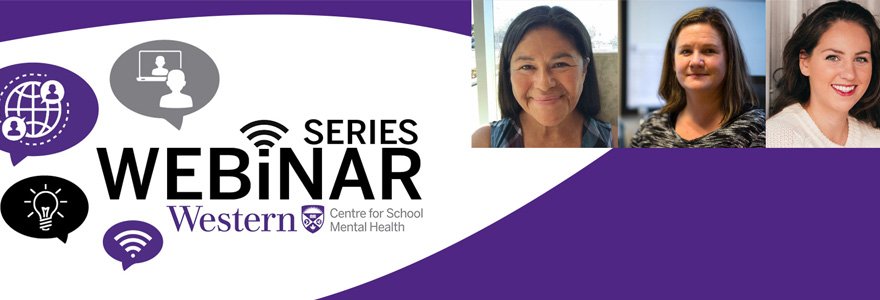
By:
Nicole Bullock
Wednesday, September 20, 2017

Culturally relevant, safe, empowering.
Over the past 5 years the Mental Health Commission of Canada has worked with communities and leaders across Canada to develop a culturally relevant mental health first aid program for First Nations. As the first national health promotion effort developed with First Nations, the Centre for School Mental Health research team has spent four years evaluating the program with First Nations community members, First Nations consultants, and the Mental Health Commission of Canada. The free webinar series offered by the Centre was designed to share the programs development and vision, outcomes, and importance of cultural safety when considering programming and research.
Ann Seymour, Indigenous Program Specialist at the Mental Health Commission of Canada started the series off with a presentation on the development of the Mental Health First Aid First Nations program and the goals and visions of the course moving forward. Her presentation involved discussion of why and how the Mental Health First Aid First Nations program was adapted from the MHFA Basic course. Themes included walking in two worlds, circles of support, and EAGLE. Seymour also answered an array of questions posed by webinar participants in which she commented on during the presentation.
Claire Crooks, Director of the Centre for School Mental Health followed up on Seymour’s presentation with a discussion on Mental Health First Aid First Nations program outcomes. Referencing data from the 4 year mixed-methods evaluation on the program, Crooks identified that course participants indicated an increase in mental health knowledge, skills application, and self-efficacy to engage with and help a person with a mental health problem.
Andrea Lapp, Project Coordinator for the Centre for School Mental Health concluded the series with an important presentation on the paradigm and necessity of cultural safety in mental health promotion programming and research. The Mental Health First Aid First Nations program was modified significantly in order to ensure an increase in cultural relevancy and safety for First Nations contexts. Lapp’s discussion included the extent to which the course was experienced as culturally safe by participants and factors that attributed to the experience.
For more information on Mental Health First Aid First Nations or to review the webinar series’ presentations and webinar recordings, click here.